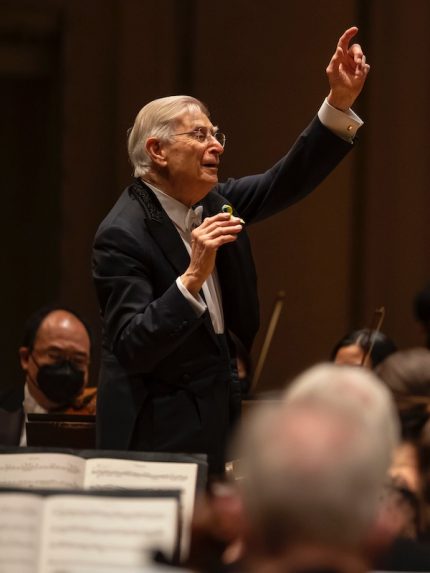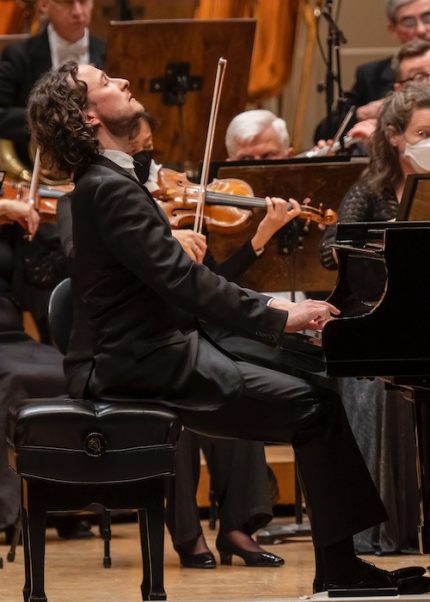Powerful Bruckner, engaging Mozart from Blomstedt, Helmchen and CSO

One of the more heartening developments at Orchestra Hall in recent seasons has been the return of Herbert Blomstedt as a regular podium guest of the Chicago Symphony Orchestra. The Springfield-born, Swedish conductor draws consistently inspired results with his baton-less direction and economical gestures.
And so it was again on a snowy Thursday night with Blomstedt—notably spry at 94—leading a towering performance of Bruckner’s Symphony No. 4.
But first, as they say in radio, Mozart.
Music of Wolfgang Amadeus makes a companionable pairing with Bruckner, and the evening led off with Martin Helmchen as solo protagonist in Mozart’s Piano Concerto No. 17.
The German pianist is one of those rare artists who brings both freshness and expressive depth to everything he plays, as displayed in past CSO stands. On this occasion, the two musicians proved ideally sympathetic partners with the CSO in the wide-ranging expressive contours of K. 453.
Helmchen’s forceful left hand initially bestowed a jarring music-box quality on the main theme. But the pianist’s performance soon got into gear, meshing fluently with Blomstedt’s gracious accompaniment.

Apart from one vertigo-inducing rallentando, the soloist’s playing was stylish and shorn of idiosyncrasy. Helmchen is an assertive, full-bodied Mozart pianist, the polar opposite of say, Mitsuko Uchida (who will perform two Mozart concertos on the same stage with the Mahler Chamber Orchestra later this month). His playing was spirited and technically immaculate throughout the first movement, with a nice playful caprice in the cadenza.
The somber Andante is one of Mozart’s finest inspirations and Helmchen brought a poised, searching expression to this dark-hued music that made his playing feel almost ad libitum. The CSO front-desk winds partnered with the soloist with comparable grace and eloquence (on this occasion, flutist Stefán Ragnar Höskuldsson, oboists Lora Schaefer and Scott Hostetler, and bassoonists William Buchman and Dennis Michel).
Mozart followed this inward music with one of his happiest finales, even by his standard. The variations on the sprightly main theme—which Mozart was proud of teaching to his pet starling—were vital and vividly characterized. Helmchen and the orchestra batted the music back and forth in engaging fashion, the brief minor-key episode a passing dark cloud, rounded off with a fizzing rendition of the opera buffa-style finale. Helmchen provided first-class Mozart playing by any measure, with superb support from Blomstedt and the orchestra.
As an encore, the pianist offered more Mozart with the Adagio from the Sonata in F Major, K.332, which he dedicated to the people of Ukraine. Helmchen’s rendering—suffused with poised melancholy and an undergirding of quiet strength—could not have been more beautifully played nor more reflective of its dedication.
The second half was devoted to Bruckner’s Fourth Symphony, which the composer titled the “Romantic,” though that designation could apply equally to any of his works in the genre.
At these performances, Blomstedt is utilizing the new critical edition of the Fourth by Benjamin Korstvedt. To this Bruckner non-scholar, the emendations sounded minimal from previous established editions, apart from a distinguishing of tempos between sections of each movement.
That element was likely due as much to Blomstedt’s clarifying direction as the new Urtext. Conducting with clear cueing and precise gestures, the conductor led a natural, ego-less reading yet one that was imbued with roiling strength and ballast.
Blomstedt’s patient approach and unfussy integrity paid their own ample dividends, to a somewhat surprising degree. The first tutti blast of the opening movement was like a hurricane wind hitting one in the face. Blomstedt guided the expansive movement with an alert focus bar to bar yet the performance never turned episodic or small-ball. He consistently kept his eye on the overall structure, negotiating the score’s peaks and valleys, giving the moments of uneasy stillness and dance-like lightness as much focus as the majestic brass volleys, while building to a dauntingly powerful coda.
Blomstedt took the slow movement’s tempo marking (Andante quasi allegretto) at face value, his dynamic marking precise but never pedantic. The Scherzo’s blasts of brass were almost primeval in their raw energy, and the wind playing in the trio section could charm the Alpine avians out of the trees.
For all its amiable qualities, Blomstedt’s Bruckner clearly meant business as evinced by the the explosive brass outburst that heralds the start of the finale. Again, contrasting elements were balanced with consummate skill, the strings’ yielding warmth as impactful as the stentorian power of the brass chorales. Blomstedt’s steady buildup to the coda was masterful, the final triumphant peroration resounding through the hall. After the last chord, the conductor held the silence for a good full minute before lowering his arms to commence the applause and ovations.
David Cooper’s opening horn call was more boldly present than distant and atmospheric but after that the CSO principal horn was first-rate throughout—nimble, expressive and with full-metal power when required.
The same goes for the entire brass section, which was primus inter pares amid the honors in this powerful yet humane Bruckner performance.
The program will be repeated 8 p.m. Saturday. cso.org